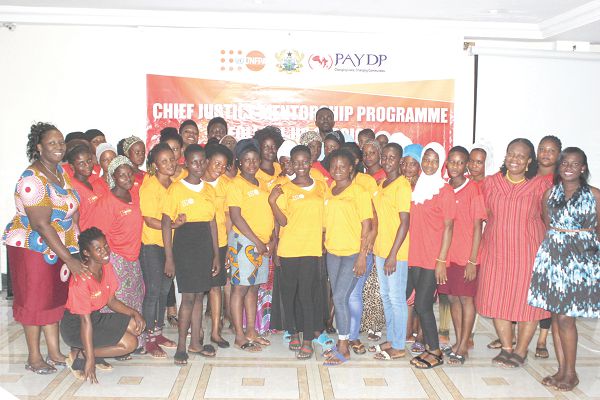
Head porters benefit from Chief Justice Mentorship Programme
Twenty female porters (kayayei) have been provided with livelihood skills under the Chief Justice Mentorship Programme that also aims at ending child marriage in the country.
The beneficiaries also underwent a two-day mentoring session in Accra where they were counselled on how to fulfil their dreams and aspirations. They were also educated on the dangers of child marriage.
Each year, 20 of such young women are enrolled onto the programme that is being supported by the United Nations Population Fund (UNFPA).
Programme
The annual mentoring programme was initiated by the former Chief Justice, Mrs Georgina Theodora Wood, in 2007.
The counselling includes providing beneficiaries the opportunity to observe court proceedings to expose them to the work of the legal system.
They also learn from life experiences of accomplished professionals and entrepreneurs on how to become successful in their chosen vocations.
Beneficiaries are selected from markets in Accra, Techiman and Kumasi.
They include female porters who have not completed senior high school, those who are from poor households, especially from the northern part of the country, and porters who are married or at risk of child marriage.
Child marriage
The Executive Director of Purim African Youth Development Platform, (PAYDP), implementing partners of the initiative, Ms Aku Xornam Kevi, said the programme was in line with the global campaign to end child marriage by empowering vulnerable girls with skills.
She said child marriage was a global phenomenon that prevented girls from realising their potential and, therefore, constituted one of the major impediments to the development of nations.
Ms Kevi said in 2014, Ghana accepted the universal call to end child marriage in accordance with international conventions and declarations.
Commendation
She commended Ghana for taking measures to comprehensively address the issue in the country as contained in a 2017 report by the Ministry of Gender, Children and Social Protection.
According to her, the UNFPA was also collaborating with other development partners to facilitate efforts to end the phenomenon in the country.
Ms Kevi further stated that most of the porters claimed they were compelled to come to Accra and other cities to engage in menial jobs because of the lack of skills and job opportunities in their various communities while some alleged they escaped from forced marriages.
“In a previous intervention, the UNFPA reached out to more than 5,000 kayayei.
We intend to further help address the challenges and risks facing them in the Greater Accra, Ashanti, Bono and Ahafo regions to reduce their vulnerabilities,” she added.
Success stories
Some of the beneficiaries of the programme shared testimonies of their journey to becoming professionals and entrepreneurs and urged other women porters to also strive to leave the streets.
A beneficiary who is now a teacher trainee at the University of Education, Winneba, Ms Janet Poku-Kwatey, said she was assisted through the programme to rewrite her examination which enabled her to gain admission to the university.
For her part, Ms Hafisah Suleman said she also excelled in her senior school certificate examination and was waiting to be offered admission to the university after receiving similar assistance to rewrite the exam.
